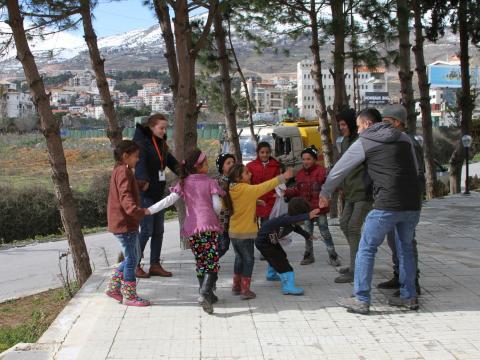Lowering risks on street working children

Behind every refugee crisis are thousands of different and unique stories from people who experienced the worst hardships. Forced to flee their country, Syrian refugees in Lebanon are doing their best to survive against all odds. In normal situations, the father is the income provider, however in some cases, he may be unable to work due to injury, trauma, illness or the lack of job opportunities in the case of Syrian refugees now living in Lebanon.
Unfortunately, children are having to pay the heavy price, as parents are forced to have their children work on the streets, selling items such as toilet papers, chewing gum, in order to bring in income to the household.
Twin brothers Bakour and Mhammad, 14, have been working on the streets of the Bekaa selling tissue papers. “Often we start working at 10 a.m. and finish at around six in the evening. The conditions are difficult, but we must do it to support our families,” they emphasize.
Mhammad, whose dream is to become an engineer one day wants a fresh and new start in life. “I want to travel to the United States. Hopefully, we can have a better life there,” he says. As for Bakour, his dream is to become a pilot, and he is quite aware of the importance of education. “I know that education is the key to success in life, but for now we have to work to support our families,” Bakour stresses.
World Vision Lebanon staff met Bakour and Mhammad during the community-based psycho-social support activities. Many of the working children in Bekaa, Lebanon are engaged in the worst forms of child labor, just like Bakour and Mhammad. To reduce the risk on these children and secure a better future for them and their families, World Vision provides children who work on the streets with Community-based Psycho-social Support (PSS) in an already identified safe space.
Through our Child Protection program we aim to raise awareness on children safety. These children are referred to the centers where they receive focused PSS services. Children with alarming cases are then referred to specialized case management services through a social worker available at the center. World Vision also engages with the children’s caregivers and the communities in which they live through tailored training to ensure that children grow up in a protective environment that promotes their safe development.
The twin brothers are enrolled in the program. “We have never been approached by a humanitarian organization before, but when World Vision enrolled us, we for some reason we immediately trusted them. They were really friendly,” Bakour notes. “This is our second session at the center and I am finding the programme extremely helpful. We hope this will help us go to school again one-day” Mhammad Adds.
Pamela Daoud, the program manager at World Vision admits at first they had some challenges reaching out to the children and earning their trust as well as that of their parents’. “These children go through a lot while working on the streets. They can’t easily trust anyone approaching them, but the project field teams did a great job gaining their trust,” she explains.
Rwaida, Mhammad and Bakour’s mother paid a visit to the center just to understand what her children are learning. “I really want them to go back to school, but financially, it’s hard,” she admits. “We lost everything because of the war, including some of our family members. We do not have a home to go back to. My husband has diabetes, and his eyesight is weak,” she continues. It’s impossible for him to work, so I was forced to let my children work,” she confesses.
Michelle, a social worker in the program teaches the children the importance of communication and respect to resolve problems, rather than resorting to violence. “Some of these children lack the basic principles of being respectful with each other. They use violence to resolve their problems,” she notes with concern. The children also receive life skills sessions. Such small acts, Michelle is convinced, will lead to the change.
Michelle’s goal is for the children to learn how to be respectful, identify safe and dangerous places, as well as their, their basic development. “I have introduced them to drawing and painting and through their drawings, we are able to recognize if they were subjected to any sort of abuse. Drawing can help us identify the issues they are facing and set our objectives with every child.” Michelle explains.
World Vision in partnership with UNICEF and funding from EU Regional Trust Fund 'Madad' was able so far to reach 121 street-based children in Bekaa who are at risk of the worst forms of child labor just like Bakour and Mhammad, and refer 84 of them to centers where they receive skills such as building their self-esteem, promoting resilience and coping mechanisms.